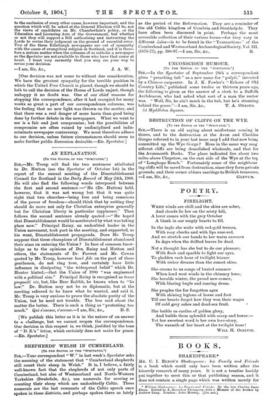[To THE EDITOR Or TUE "SPECTATOR."' SIE,—Mr. Troup will find
the two sentences attributed to Dr. Hutton (see the Spectator of October 1st) in the report of the annual meeting of the Disestablishment Council for Scotland in the Daily Record of May 24th, 1900. He will also find the following words interposed between the first and second sentence :--" He (Dr. Hutton) held, however, that it was not wrong but that it was quite right that two churches—being free and being conscious of the power of freedom—should think that by uniting they should do more not only for Christian enterprise generally but for Christian liberty in particular (applause)." Then
follows the second sentence already quoted He hoped that Disestablishment would be accelerated by what was taking place now." Principal Rainy, an undoubted leader in the Union movement, took part in the meeting, and supported, as his wont, Disestablishment propaganda. Does Mr. Troup suppose that these champions of Disestablishment abandoned their aims on entering the Union ? In face of common know- ledge as to the opinions of Drs. Rainy and Hutton and others, the statements of Dr. Forrest and Mr. Cowan quoted by Mr. Troup, however bond fide on the part of these gentlemen, do not ring true, and certainly have little influence in dissipating "the widespread belief" which Dr. Hunter hinted,—that the Union of 1900 "was engineered with a political aim." Principal Rainy is recognised as tenax propositi sir, but, like Bret. Rabbit, he knows when to "lie low." Dr. Hutton may not be so diplomatic, but at the meeting referred to he knew what he wanted, and said it. Mr. Troup is very anxious to prove the absolute purity of the Union, but he need not trouble. The less said about the matter the better. There is such a thing as "protesting too much." Qui s'excuse, s'accuse.—I am, Sir, &e., D. S.
[We publish this letter as it is in the nature of an answer to a challenge, but we cannot reopen the correspondence. Our decision in this respect is, we think, justified by the tone of "D. S.'s " letter, which certainly does not make for peace. —En. Spectator.] SHEPHERDS' WELSH IN CUMBERLAND.










































 Previous page
Previous page